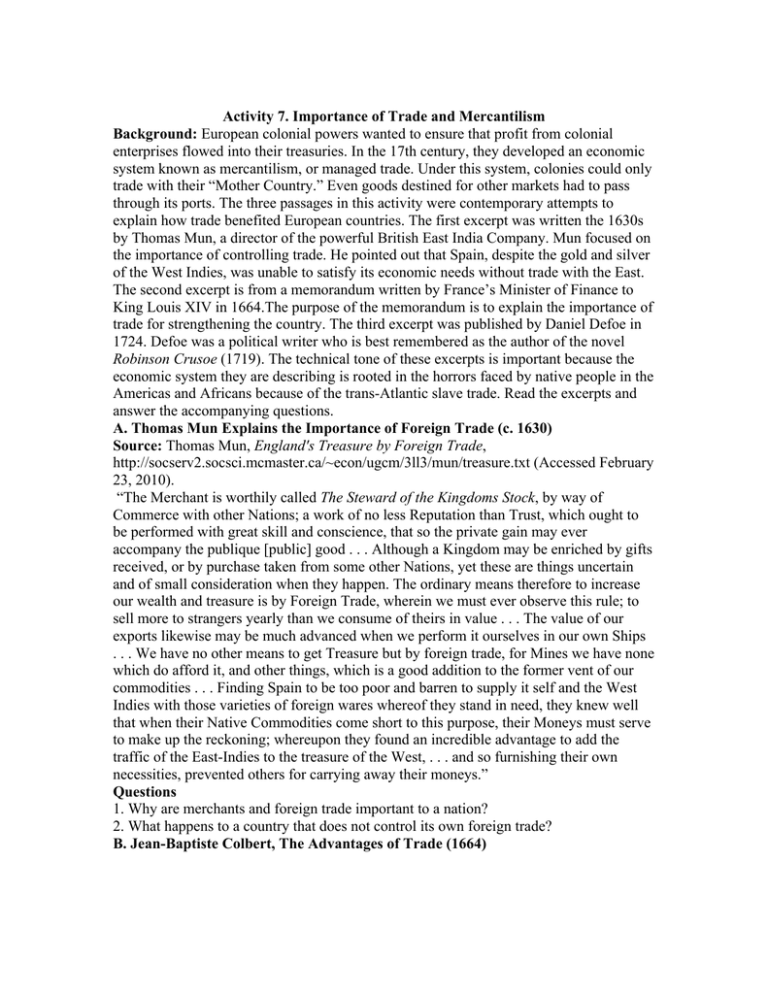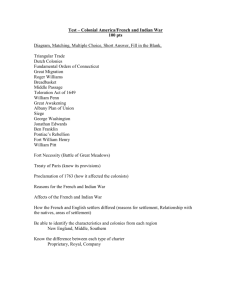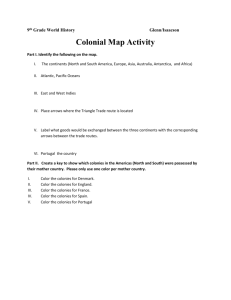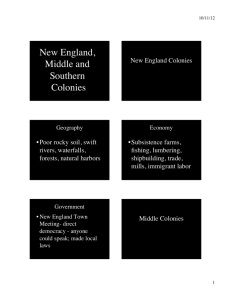enterprises flowed into their treasuries. In the 17th century, they... system known as mercantilism, or managed trade. Under this system,... Activity 7. Importance of Trade and Mercantilism
advertisement

Activity 7. Importance of Trade and Mercantilism Background: European colonial powers wanted to ensure that profit from colonial enterprises flowed into their treasuries. In the 17th century, they developed an economic system known as mercantilism, or managed trade. Under this system, colonies could only trade with their “Mother Country.” Even goods destined for other markets had to pass through its ports. The three passages in this activity were contemporary attempts to explain how trade benefited European countries. The first excerpt was written the 1630s by Thomas Mun, a director of the powerful British East India Company. Mun focused on the importance of controlling trade. He pointed out that Spain, despite the gold and silver of the West Indies, was unable to satisfy its economic needs without trade with the East. The second excerpt is from a memorandum written by France’s Minister of Finance to King Louis XIV in 1664.The purpose of the memorandum is to explain the importance of trade for strengthening the country. The third excerpt was published by Daniel Defoe in 1724. Defoe was a political writer who is best remembered as the author of the novel Robinson Crusoe (1719). The technical tone of these excerpts is important because the economic system they are describing is rooted in the horrors faced by native people in the Americas and Africans because of the trans-Atlantic slave trade. Read the excerpts and answer the accompanying questions. A. Thomas Mun Explains the Importance of Foreign Trade (c. 1630) Source: Thomas Mun, England's Treasure by Foreign Trade, http://socserv2.socsci.mcmaster.ca/~econ/ugcm/3ll3/mun/treasure.txt (Accessed February 23, 2010). “The Merchant is worthily called The Steward of the Kingdoms Stock, by way of Commerce with other Nations; a work of no less Reputation than Trust, which ought to be performed with great skill and conscience, that so the private gain may ever accompany the publique [public] good . . . Although a Kingdom may be enriched by gifts received, or by purchase taken from some other Nations, yet these are things uncertain and of small consideration when they happen. The ordinary means therefore to increase our wealth and treasure is by Foreign Trade, wherein we must ever observe this rule; to sell more to strangers yearly than we consume of theirs in value . . . The value of our exports likewise may be much advanced when we perform it ourselves in our own Ships . . . We have no other means to get Treasure but by foreign trade, for Mines we have none which do afford it, and other things, which is a good addition to the former vent of our commodities . . . Finding Spain to be too poor and barren to supply it self and the West Indies with those varieties of foreign wares whereof they stand in need, they knew well that when their Native Commodities come short to this purpose, their Moneys must serve to make up the reckoning; whereupon they found an incredible advantage to add the traffic of the East-Indies to the treasure of the West, . . . and so furnishing their own necessities, prevented others for carrying away their moneys.” Questions 1. Why are merchants and foreign trade important to a nation? 2. What happens to a country that does not control its own foreign trade? B. Jean-Baptiste Colbert, The Advantages of Trade (1664) Source: Jean-Baptiste Colbert, Lettres, Instructions et Memoires de Colbert, vol. 2, ed. P. Clement (Paris: Librairie Imperiale, 1863), pp. 263, 268-71. http://www.fordham.edu/halsall/mod/1664colbert.html (Accessed February 25, 2010). As for foreign trade . . . except for a few ships from Marseilles . . . maritime trade in the kingdom does not exist, to the point that for the French West Indies one-hundred-fifty Dutch vessels take care of all the trade, carry there the foodstuffs that grow in Germany and the goods manufactured by themselves, and carry back sugar, tobacco, dyestuffs, which they take home, where they pay customs duty on entry, have processed, pay export duties, and bring them back to us . . . The value of these goods amounts to two million . . . every year, in return for which they take away what they need of our manufactures. Instead, if we ran our own West Indies trade, they would be obliged to bring us these two million in hard cash . . . I believe everyone will easily agree to this principle, that only the abundance of money in a State makes the difference in its greatness and power. Aside from the advantages that the entry of a greater quantity of cash into the kingdom will produce, it is certain that, thanks to the manufactures, a million people who now languish in idleness will be able to earn a living. An equally considerable number will earn their living by navigation and in the seaports. The almost infinite increase in the number of ships will multiply to the same degree the greatness and power of the State. These, in my opinion, are the goals that should be the aim of the King's efforts and of his goodness and love for his people. Questions 1. Why is Colbert concerned about the financial health of France? 2. How does control over trade benefit every aspect of the economy and society? C. Daniel Defoe, The Complete English Tradesman (1719) Source: http://www.gutenberg.org/files/14444/14444-h/14444-h.htm (Accessed February 23, 2010) It is owing to trade that new discoveries have been made in lands unknown, and new settlements and plantations made, new colonies planted, and new governments formed in the uninhabited islands and the uncultivated continent of America; and those plantings and settlements have again enlarged and increased the trade, and thereby the wealth and power of the nation by whom they were discovered and planted. We have not increased our power, or the number of our subjects, by subduing the nations which possess those countries, and incorporating them into our own, but have entirely planted our colonies, and peopled the countries with our own subjects. Excepting the Negroes, which we transport from Africa to America as slaves to work in the sugar and tobacco plantations, all our colonies, as well in the islands as on the continent of America, are entirely peopled from Great Britain and Ireland, and chiefly the former; the natives having either removed further up into the country, or, by their own folly and treachery raising war against us, been destroyed and cut off. As trade alone has peopled those countries, so trading with them has raised them also to a prodigy of wealth and opulence; and we see now the ordinary planters at Jamaica and Barbadoes (sic) rise to immense estates, riding in their coaches and six, especially at Jamaica, with twenty or thirty negroes on foot running before them whenever they please to appear in public . . . This trade to our West Indies and American colonies, is very considerable, as it employs so many ships and sailors, and so much of the growth of those colonies is again exported by us to other parts of the world, over and above what is consumed among us at home; and, also, as all those goods, and a great deal of money in specie, is returned hither for and in balance of our own manufactures and merchandises exported thither. Questions 1. How has trade expanded the power, prestige and wealth of Great Britain? 2. What role does slavery and the slave trade play in the promotion of trade?





